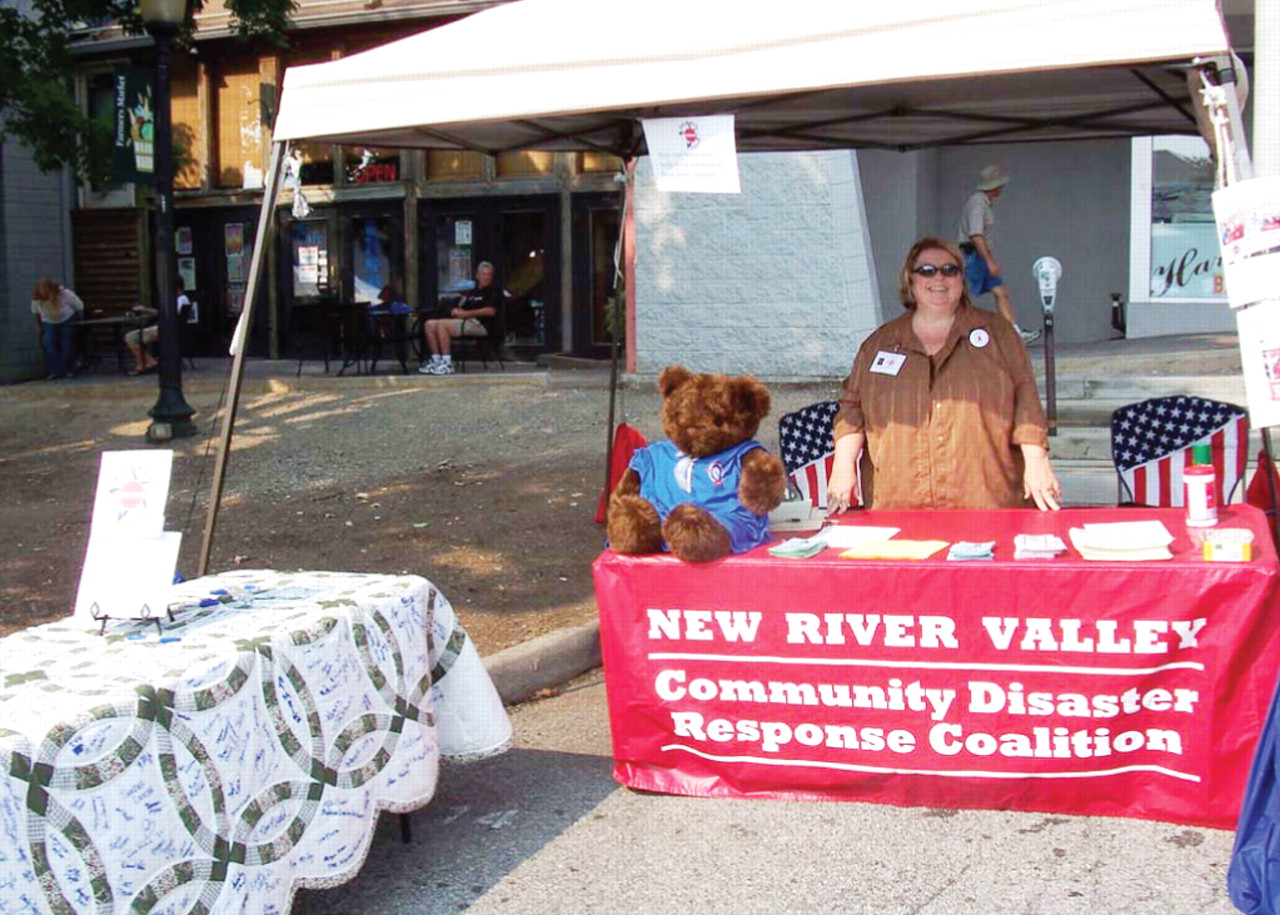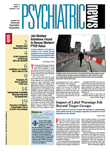When the first shots rang out on the Virginia Tech campus in Blacksburg on April 16, one phone call to the New River Valley Community Disaster Response Coalition (CDRC) launched a carefully synchronized plan that would ultimately extend much-needed support to thousands of people whose lives were affected by the shootings.
“People have a hard time believing that a disaster will ever affect them,” said Dorinda Miller, Ph.D., in an interview with Psychiatric News.
Miller, along with several others, created the CDRC in 2002 with funds from the American Psychiatric Foundation. The goal was to meet the mental health needs of people affected by disaster in the New River Valley, an area that encompasses four mountainous counties and includes Blacksburg, Va., home of Virginia Tech.
When the deadliest mass shooting in U.S. history took place in the quiet college town, Miller, together with an entire community of trained volunteers, was ready to spring into action.
Miller noted that the genesis of the New River Valley CDRC began with the 9/11 terrorist attacks.
At the time, she was providing mental health relief services at the Pentagon with the Red Cross and said she realized that there was no way one agency could hope to meet the disaster mental health needs of an entire community and that she would need to form partnerships with other agencies in the New River Valley, where she ran A-Kee Inc., a nonprofit organization dedicated to providing the community with disaster-relief mental health services and education.
Her goal was to develop a program that would provide consistent disaster mental health training to local mental health clinicians and community members and forge partnerships with local emergency and rescue teams.
Miller worked with colleagues Amy Forsyth-Stephens,M.S.W., and Harvey Barker, Ph.D., the head of the New River Valley Community Services Center, a mental health agency, to develop a disaster mental health protocol.
In doing so, she sought guidance from local county emergency coordinators and the emergency planner for Virginia Tech. She then began recruiting volunteers to train them to provide disaster mental health services by using a curriculum she developed.
The daylong training, according to Miller, educates volunteers about crisis-intervention techniques, good-listening techniques, symptoms indicating an individual needs to be referred to a mental health clinician in the community, confidentiality of victims and family members, and ways to take care of themselves under stressful situations. Trainees also learn about how disasters affect certain populations, such as children, the elderly, and people with various types of disabilities.
Training typically takes place three or four times a year and is free, according to Miller.
Most Trainees are Laypeople
Miller's approach, she noted, focuses on resilience and empowerment and is not meant to probe victims about the trauma they have endured. “We want to keep people functioning,” she noted.
About one-third of the CDRC trainees are licensed and nonlicensed mental health professionals from the community. Many work with the New River Valley Community Services Center, which provides mental health services to the community, including substance abuse workers, emergency service workers, case managers, and residential support personnel. Two-thirds of CDRC trainees are laypeople—hairdressers, retired seniors, students, business people, clergy, and teenagers.
All of the CDRC volunteers take the same course in disaster mental health because “they are all novices in terms of disaster operations,” Miller said.
Community Liaisons Established
One of the most important aspects of the CDRC is its partnerships with various community organizations, including the local branch of the Red Cross, hospitals, hospices, emergency medical technicians, clergy, schools, fire/rescue squads, and police. “We teach them about what we do and how they can use us,” Miller said.
Prior to the Virginia Tech shootings, volunteers with the CDRC responded mostly to floods and fires.
The CDRC serves to supplement New River Valley Community Services, which is designated as the lead agency in disaster mental health, as well as the local branch of the Red Cross. By the time of the Virginia Tech shootings in April, the capacities of the CDRC volunteers were ready to be put to the test.
“With the bulk of the shootings over in 45 minutes,” noted Forsyth-Stephens, director of the New River Valley Mental Health Association,“ the situation became a mental health disaster of epic proportions,” she told Psychiatric News. “We are lucky that Dr. Miller is a member of our community and has been planning for just this kind of event since 9/11.”
Forsyth-Stephens called on 50 mental health professionals working with the free clinic that operates under the auspices of the mental health association to supplement the cadre of mental health professionals trained by Miller.
The CDRC supports its disaster-relief activities primarily through consulting and training across Virginia and the rest of the country. Students from Edward Via College of Osteopathic Medicine and staff from several agencies who had received CDRC training also stepped forward to help.
Miller noted that there were also large numbers of“ spontaneous” volunteers—well-intentioned people from around the country who showed up wanting to help in some way. “This was both a blessing and a burden,” she noted.
In the hours after the shooting, CDRC, its partner agencies, and Virginia Tech staff established a staging center at the Virginia Tech Inn, where families gathered to await news of loved ones.
They also set up a respite center for law-enforcement personnel at the inn—a quiet space away from the activity where police could listen to music, contact family members, and get a massage.
During this time, CDRC volunteers worked closely with local clergy and mental health professionals from the Virginia Tech Cook Counseling Center, which was inundated with students who were still on campus. CDRC volunteers worked 24-hour shifts until the family staging area was closed at the end of that week.
In the days that followed, CDRC volunteers were posted at firehouses, police stations, coffee shops, and other businesses in Blacksburg, according to Miller.
Miller noted that attendance was nearly perfect when the school reopened.“ Students showed up to support one another and their professors,” she said.
While working in conjunction with Virginia Tech's student counseling center, Miller and her colleagues recruited more than 300 volunteers for Project Class Reentry a week after the shootings.
Chris Flynn, Ph.D., director of Virginia Tech's Cook Counseling Center, requested support teams' presence in each class where a student or faculty member had been injured or killed once classes reconvened. Teams were also assigned on the Drill Field, Squires Student Center, dining halls, and in downtown Blacksburg providing support and “compassionate loitering,” Miller noted.
“We had walkie-talkies, vans shuttling between buildings, and a message center,” said Forsyth-Stephens.
When graduation ceremonies began a couple of weeks later, Miller recalled, CDRC volunteers provided around-the-clock coverage with the families of injured and deceased students who were housed in a campus dorm.
Stephens said that the tasks performed by dozens of lay volunteers trained by Miller made it possible for mental health clinicians to reach out to students and faculty on campus.
“Having such a large group of laypeople who were ready to hit the ground running enabled us to pull together a massive mental health response,” following the shooting, she noted.
Since graduation, Miller and the CDRC teams have appeared at local fairs and other community gatherings to disseminate information about the CDRC and to offer support to people affected by the shooting.
She noted that calls to the New River Valley Community Services Center have increased by 50 percent since the shooting. Most of the people are calling with concerns about mental health problems of a loved one, Miller noted.
“I think that right now, we are in a very difficult phase—people [who have been directly or indirectly impacted by the shootings] are disillusioned and angry. They realize that life will never be the same again, and they are exhausted.”
It is Miller's hope that the CDRC will provide a model for other communities in the nation to follow so that they can galvanize local resources to respond to disasters.
“This is about teaching folks to help each other through rough times. People want to help, they just need to be prepared and trained before it hits their community.
Information about the New River Valley Community Disaster Response Coalition is posted at<nrvcdrc.org>.▪

